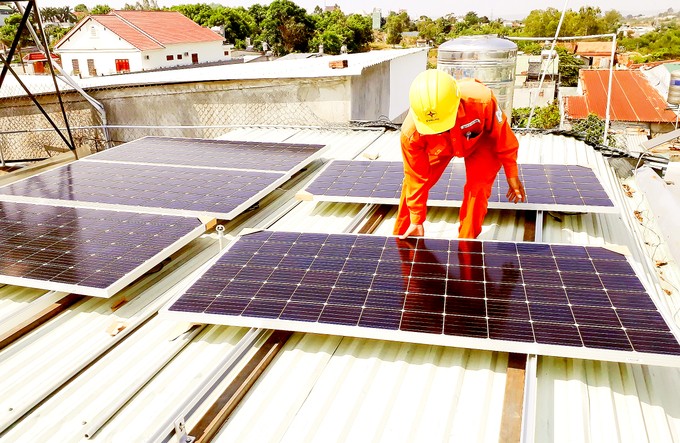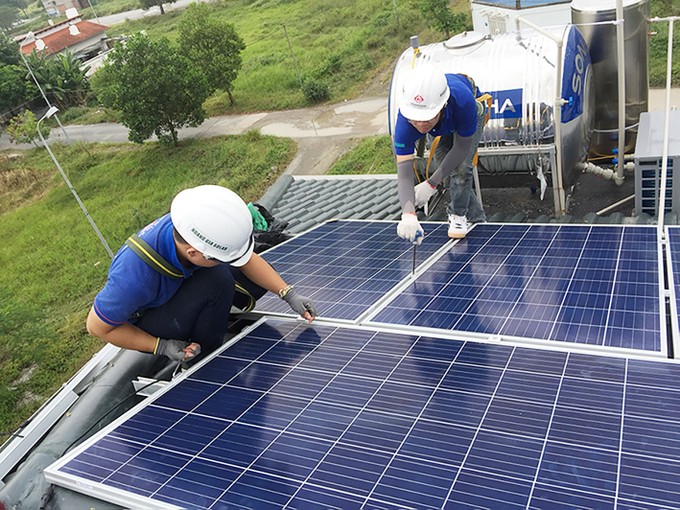Solar electricity purchased via storage batteries: A viable solution
Installing solar panels integrated with battery storage systems helps prevent the wastage of surplus electricity during peak sunny periods.

Energy experts suggest that clear policies specifying the purchase of solar panels with integrated battery storage at fixed prices will undoubtedly reshape Vietnam's landscape of renewable energy investment and utilization in a positive direction.
Recently, the Government Office announced Deputy Prime Minister Tran Hong Ha's conclusion on drafting and issuing decrees that regulate direct electricity trading between renewable energy generators and large electricity consumers, as well as policies promoting the development of rooftop solar systems for self-generation and self-consumption. Regarding the draft decree on incentivizing rooftop solar self-generation and self-consumption, the Deputy Prime Minister has requested clarification on the definitions of self-production and self-consumption, focusing on electricity production primarily for use. In cases of surplus electricity, with the installation of storage batteries or solar power accumulation, Vietnam Electricity Group (EVN) will conduct research and propose purchasing excess electricity at reasonable prices, particularly during peak hours.
If there are no storage batteries, EVN will buy electricity at the lowest market price it purchases from other household electricity sellers. Surplus electricity purchased by EVN can potentially be offset against electricity purchased by individuals from EVN. Additionally, there should be research and calculation on dual-component electricity pricing: one for periods without solar power, and another for peak hours when there is ample sunlight. Pricing considerations should distinguish between scenarios with and without storage devices to ensure fairness and promote investment in renewable energy.
The Deputy Prime Minister also called for a study on support policies for rooftop solar investors, particularly concerning the installation of energy storage devices, which should include plans for pricing, taxes, interest rates, and installation costs. The Ministry of Industry and Trade and EVN were assigned to compile, analyze, and monitor the development of rooftop solar systems for self-generation and self-consumption in alignment with the approved national electricity development plan. They were also tasked with evaluating the integration of self-generated rooftop solar energy into the national grid to ensure safe system operation.
Harmonious benefits for all parties
According to energy expert Ngo Duc Lam, former Deputy Director of the Institute of Energy, the Ministry of Industry and Trade previously held the view that rooftop solar systems for self-generation and self-consumption should either not be sold or be sold at zero cost. However, there is now a policy promoting the use of storage batteries to enhance the flexibility of the power grid. Amid electricity shortages, EVN must purchase electricity from abroad, invest in grid infrastructure, or utilize costly oil-powered sources, all of which incur high expenses. Therefore, investing in storage batteries and selling excess electricity to EVN remains advantageous. This approach ensures mutually beneficial outcomes for the Ministry of Industry and Trade, EVN, and rooftop solar investors.

Meanwhile, Mr. Pham Phuoc Binh, Director of Bincon Joint Stock Company, highlighted that integrating solar power with storage batteries is a beneficial policy. Solar energy's instability and unpredictable fluctuations in current make regulation challenging, thus installing batteries for energy storage eases EVN's burden in managing the power grid. However, the cost of battery installation is a crucial consideration for businesses. Moreover, implementing this policy requires careful attention to technical aspects, including regular internet-based monitoring to ensure the battery system operates at its full capacity. Only in this way can the encouragement of individuals and businesses to invest in new batteries be effective. Simultaneously, ensuring fire safety is essential when installing solar power systems with energy storage capabilities.
A business owner investing in rooftop solar power in Ho Chi Minh City shared that the trend of solar power storage has garnered significant interest, particularly during the hot season. Investing in rooftop solar and utilizing storage batteries is already beneficial; being able to sell excess energy storage further enhances investor confidence. Businesses are eager for regulatory agencies to make timely decisions, ensuring that investors in storage batteries, solar panels, and rooftop solar installations can proceed with confidence, ushering in a new era for green energy.
Energy expert La Hong Ky pointed out that there are currently no technical standards applied to components such as solar panels, storage devices, and batteries. This lack of standards results in insufficient control over system quality, posing risks related to safety, fire prevention, and the stability of power quality. Grid connections for electricity sales can potentially compromise grid safety. Therefore, regulatory authorities need to establish specific regulations concerning equipment, fire prevention measures, acceptance procedures, maintenance checks, and regular testing to address these concerns effectively.








